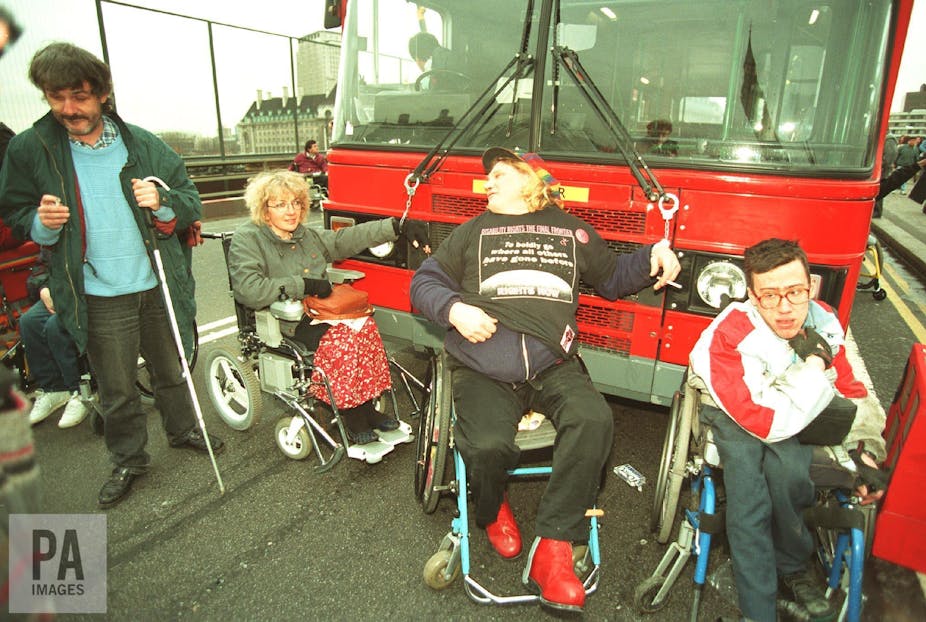The representation of disabled people in government has never been more important. In 2014, 19% of British residents said that they were disabled. The country also has an ageing population and 42% of state pension age adults – 5m people altogether – are living with disabilities.
Before the EU referendum, fears abound that the laws in place to help and protect the lives of disabled people would be disregarded, and future progress stilted. We have yet to see what impact Brexit will have, but my own research has revealed one extremely concerning fact: parliament is, and has been for some time, filled with institutionalised ableism, and without the EU’s help, the situation for disabled people may become very dire indeed.
Low priority
Even at the very start of policy and law development, disability is a very low priority. Looking just at early day motions (EDMs) – which allows MPs to voice their opinions on certain issues with no expectation to toe the party line – disability ranks behind gender and age among the protected characteristics that will get attention from lawmakers.
The motions give a good insight into MPs’ priorities. For example, Chris Ruane, former MP for the Vale of Clwyd, in 2009 specifically demanded “that this house notes … heart disease, diabetes, stroke and kidney disease, remain the number one cause of disability in the UK … and calls on the government to work with the voluntary sector … to ensure that the best care is available to those people affected”.
Though there was some increase in the number of EDMs that were proposed for the benefit of “disabled peoples”, the rate of change has been slow. When you compare the number of disability/disabled people’s EDMs in the 1992–97 parliament with the 2005–10 parliament the growth is negligible – just 3.5 percentage points.
It’s clear just from these motions that disability issues are far from a mainstream policy priority for most MPs. Even though each constituency would have a significant number of disabled people, less than a third of MPs put forward a specific disability EDM between 1990 and 2012.

There are also big differences in each political party’s record of proposing disability/disabled people EDMs. Almost two-thirds of the total proposed between 1990 and 2012 were tabled by Labour Party backbenchers. Liberal Democrat MPs put forward just under a quarter, while Conservative MPs accounted for less than 10%. The rest were put forward by “others” such as the Scottish National Party, and Plaid Cymru.
Looking at how these motions were framed, most were concerned with securing a decent level of living for disabled people, followed by tackling discrimination, and raising awareness of disabled people’s rights. When broken down by policy area the lead topics were taxation, pensions, and social security (just over a quarter of the total); health (just over a fifth); transport; employment; and education. The lead topic here points to the economic marginalisation and poverty experienced by disabled people. The others indicate that the associated problems disabled people experience span all areas of social welfare.
Institutionalised ableism
This research is more than just stats. It confirms a clear history of marginalisation and representational failings reaching back as far as World War II. Until 1970, there were just four main laws put in place that were concerned with disability. This marginalisation continued through to the 1990s when a small number of statutes were passed – though it must be noted that these were landmark pieces of legislation, such as the 1995 Disability Discrimination Act, for example.
Overall, disabled people’s representation is far from a mainstream issue in Westminster law-making. In fact it would be fair to say that without European intervention from the EU and European Convention on Human Rights, equality for disabled people would still be falling behind.
The 2010 Equality Act, the UN Convention on the Rights of Persons with Disabilities (ratified by the UK in 2009) and EC Directives on equality require the promotion of equality for disabled people in the exercise of public functions – including parliamentary representation, policy and law-making. It is in this context that Brexit is revealed as a wholly negative development for disabled people.
European legislation has been a key driver of equality for disabled people and others with protected characteristics in the UK. Going forward, vigilance will be an absolute necessity to ensure there is no reduction in disabled people’s rights and protections when the UK leaves the EU, and the Conservative government moves forward with replacing the European Convention of Human Rights with a domestic bill of rights.
Disability rights campaigners, already a strong voice, will have their work cut out for them going forward. Meanwhile MPs will need to sit up and realise that these rights must be safeguarded. Discrimination cannot continue.

